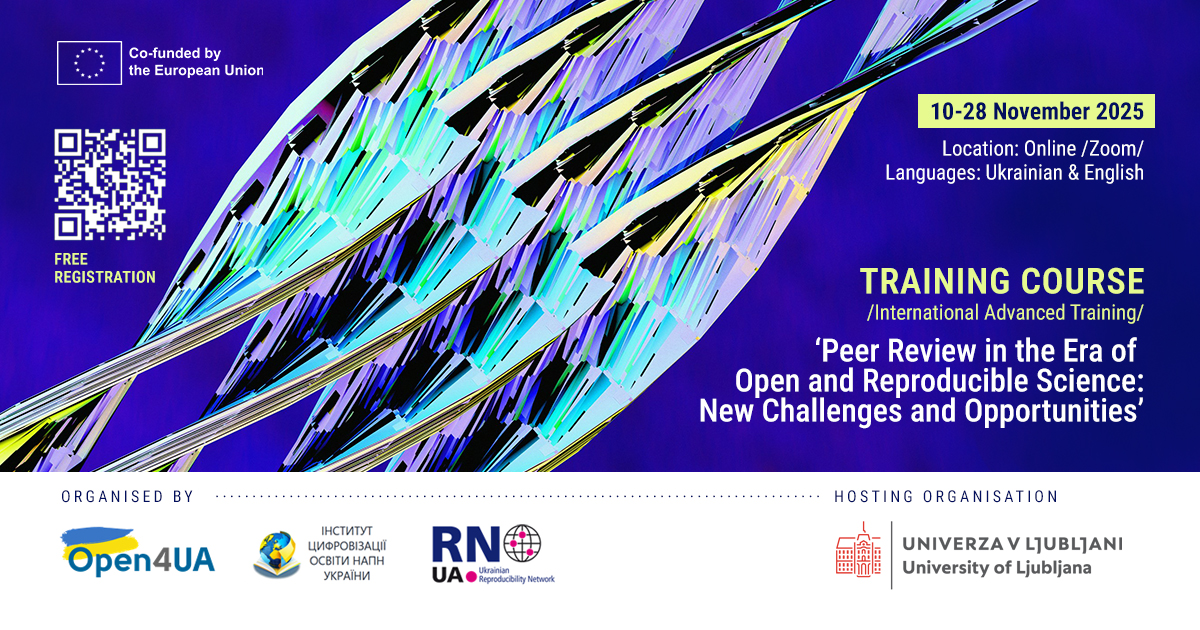We invite researchers, peer reviewers (experienced or new), journal editors, and all members of the Ukrainian academic community to take part in an engaging training course that champions open and reproducible science!
Course title: ‘Peer Review in the Era of Open and Reproducible Science: New Challenges and Opportunities’ (international advanced training)
Організатори:
- Open4UA Project Consortium
- Institute for Digitalisation of Education of the NAES of Ukraine
- Ukrainian Reproducibility Network (UARN)
- The course is hosted by the University of Ljubljana
Dates: November 11-28, 2025
Languages: Ukrainian and English
Participation: free
Course speakers and experts represent a diverse range of organizations from across Europe — including the University of Ljubljana (Slovenia); Delft University of Technology (Netherlands); EIFL (Europe-wide network); the University of Latvia (Latvia); the University of Oxford (United Kingdom); ENS Paris-Saclay (France); and Zhytomyr Polytechnic State University, Berdyansk State Pedagogical University, Lviv Polytechnic National University, and the Institute for Digitalisation of Education of the NAES of Ukraine (Ukraine).
Participation requires free registration — https://forms.gle/6tbyxWL5jU4G5A9n8
Course description
In today’s era of open science, reproducibility is at the heart of trustworthy research. A study’s value no longer depends only on what it discovers — but on whether others can verify and build upon its results. This shift makes the role of peer reviewers more important than ever.
This course will show you how to review research in a way that strengthens its transparency, reliability, and reproducibility. You’ll learn how to look beyond the written text — to the data, methods, and code behind the findings — and evaluate whether the results truly stand up to scrutiny.
Here’s what you’ll learn:
- Open science and open peer review: understand how openness transforms the scholarly communication process including reviewing and helps assess the reproducibility of data, analyses, and conclusions.
- Verifying data and methods: practice checking the completeness of datasets, documentation, and code to ensure that results can be independently reproduced.
- Reproducibility standards worldwide: explore how leading journals and research communities promote open science policies and practices.
- Giving effective feedback: learn how to provide constructive, evidence-based comments that help authors make their work more reproducible and robust.
- Digital and AI tools for reviewers: discover platforms that help trace data provenance, detect inconsistencies, and verify reproducibility with the help of automation.
- Ethics and integrity in review: discuss the authors’ and reviewers’ responsibility in ensuring fair, transparent, and reproducible research practices.
Learning outcomes
By the end of the course, you’ll know how to act as a champion of reproducibility — conducting reviews that not only evaluate research quality but also help make science more open, transparent, and verifiable.
International professional development certificate: 2 ECTS credits (~15 hours of online classes and 45 hours of independent study).
Who is this course for?
The course is designed for researchers, reviewers (with or without experience), editors of scientific journals, as well as anyone who wants to improve their reviewing skills and keep abreast of current trends in open and reproducible science.
What does the course include?
Interactive webinars with the opportunity to ask questions and receive answers in real time, as well as an online test to obtain a certificate.
Funded by the European Union. Views and opinions expressed are however those of the author(s) only and do not necessarily reflect those of the European Union or the European Education and Culture Executive Agency (EACEA). Neither the European Union nor EACEA can be held responsible for them.
